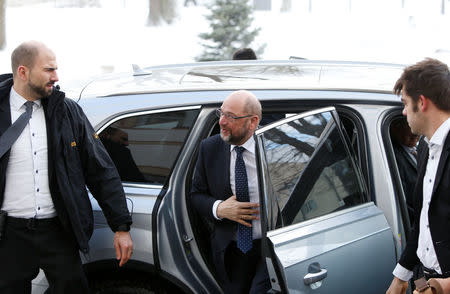German Social Democrat leader sees progress towards coalition talks with Merkel
By Michelle Martin
BERLIN (Reuters) - The leader of Germany's Social Democrats (SPD) cited progress on Wednesday in efforts to win support for formal talks with Chancellor Angela Merkel's conservatives, and some colleagues said rejecting a coalition would dent party ratings.
SPD members, who will vote on Sunday on whether to back talks, last week agreed to a coalition blueprint, which some however say does not bear enough of the party's hallmarks and they would be better off in opposition.
SPD leader Martin Schulz is criss-crossing the country to persuade delegates to give him a mandate to pursue formal coalition negotiations in the face of a strong backlash from the party's left and youth wings.
Schulz said he was upbeat after a meeting with SPD members in the southern state of Bavaria on Wednesday, following stops this week in the western state of North Rhine-Westphalia (NRW), which will send about a quarter of the delegates to Sunday's vote in Bonn.
"The mood was excellent," he told reporters, saying discussions were lively but resulted in broad support for the blueprint.
Merkel, who needs a coalition partner to shore up her fourth term in office, said on Wednesday that Germany needed a stable government and that she was counting on the SPD to "take a responsible decision" by giving the go-ahead to formal talks.
Sunday's vote will also be watched closely abroad as Germany has Europe's largest economy and Merkel has long played a leading role in the continent's economic and security affairs.
Michael Groschek, who heads the SPD in NRW, told the Bonner General Anzeiger newspaper that the blueprint would improve the lives of millions of people, and predicted a majority of delegates would back the next stage of talks.
Schulz, responding to calls from some in his party for changes to the framework agreement, said the main points could not be altered but details could be added. He cited rental caps and healthcare as areas where there could be more discussion.
Schulz also said it made sense to review the coalition after two years, a provision that set out in last week's agreement.
POLLS DILEMMA
SPD General Secretary Lars Klingbeil said he understood party scepticism about a re-run of the government that ruled Germany from 2013 to 2017, but warned against the alternative.
"Before voting at the party congress SPD delegates should be aware that there are only two realistic scenarios: negotiating further or new elections," he told Die Zeit weekly's online edition.
The SPD had planned to reinvent itself in opposition after a poor election showing in September but was persuaded to enter the talks when Merkel's attempt to form a coalition with two smaller parties failed in November.
The latest INSA poll showed the SPD slipping to 18.5 percent, its worst result in that particular survey, and weaker still than the 20.5 percent it achieved in September's election - which was its poorest performance since Germany became a Federal Republic in 1949.
The coalition question has split the SPD with branches in Berlin and the eastern state of Saxony-Anhalt recommending their members vote against. The Jusos youth faction is on a "No Grand Coalition" tour to rally delegates to reject the talks.
By contrast, Brandenburg and Hamburg are in favour of coalition talks, as are trades unions and a dozen SPD mayors from big cities.
The most divisive issues for the two blocs concern taxes, pensions, migration and healthcare but both parties are aware that a grand coalition is one of the last options on the table.
Refusal by SPD delegates to hold further talks could lead to new elections or a minority Merkel-led government for the first time in Germany's post-war era.
A top Greens lawmaker, Annalena Baerbock, told the Rheinische Post newspaper that her party could support a minority government, but also remained open to restarting the coalition talks with conservatives and the pro-business Free Democrats that had collapsed in November.
Highlighting fears about the destructive effects of the divisions within the SPD, senior party figure Carsten Schneider said "there is a real worry about the survival of the SPD".
(Additional reporting by Madeline Chambers, Holger Hansen, Tom Koerkemeier; Editing by Matthew Mpoke Bigg)

 Yahoo News
Yahoo News 

